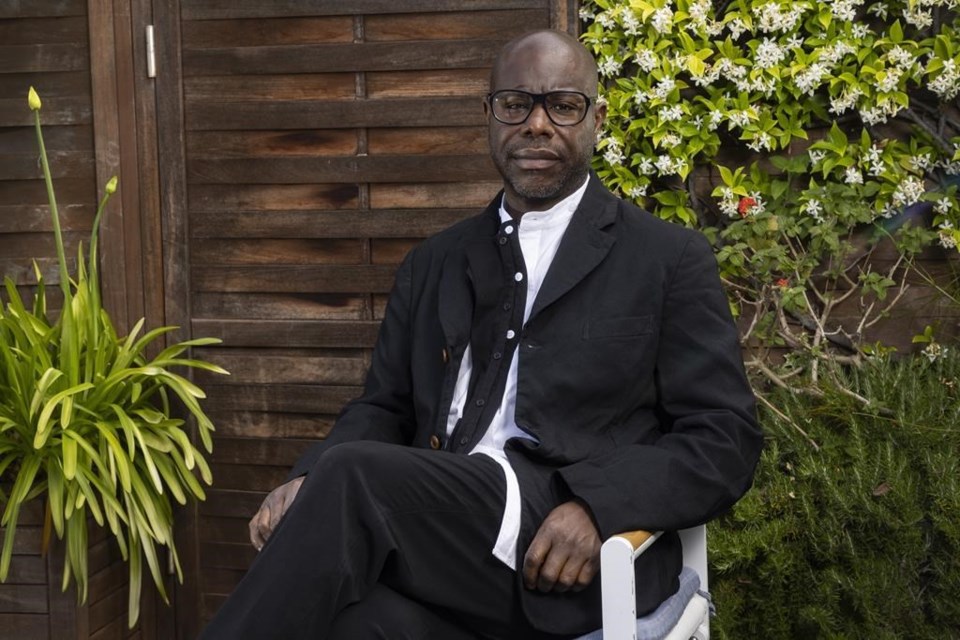In ŌĆ£Occupied City,ŌĆØ a young woman with an even voice narrates, with rigorous specificity, Nazi encounters and crimes throughout Amsterdam during World War II. The accounts go address by address, and so does McQueenŌĆÖs camera.
Yet the images that play throughout are of modern day Amsterdam. In the roving, 4 hour-plus documentary made by McQueen, the ŌĆ£12 Years a SlaveŌĆØ director, with his partner, the Dutch documentarian and author Bianca Stigter, past and present are fused ŌĆö or at least provocatively juxtaposed.
The effect can be startling, stirring and confounding. An elderly woman shifts to country music in an apartment complex where, weŌĆÖre told, a family was once arrested and sent to a concentration camp. A radio throbs with Bob Marley in a park where German officer once resided in the surrounding townhouses. A boy plays a virtual reality videogame where an execution took place.
ŌĆ£ItŌĆÖs almost like once upon a time there was this place called Earth,ŌĆØ McQueen said in an interview alongside Stigter.
ŌĆ£Occupied City,ŌĆØ which A24 releases in theaters Dec. 25, includes no archival footage or talking heads. Instead, it invites the viewer to consider the sometimes hard-to-fathom distance between one of historyŌĆÖs darkest chapters and now. ItŌĆÖs about remembering and forgetting.
ŌĆ£You want to wake people up and at the same time take them with you,ŌĆØ says McQueen, a British expat who has made Amsterdam his adoptive home with Stigter and their children.
The film is rooted in StigterŌĆÖs illustrated book which likewise catalogued the Nazi occupation of Amsterdam and the methodical murdering of its Jewish citizens. Stigter and McQueen have researched their own address. A few doors down, McQueen says, a Jewish man in hiding paid for his keep by teaching a familyŌĆÖs child how to play piano. Their lessons were conducted quietly by tapping on the table.
ŌĆ£Occupied CityŌĆØ details how the Nazi occupation unfolded, door to door, name by name. At the same time, it can be hard to reconcile those accounts with the accompanying footage that captures mostly civic harmony throughout modern Amsterdam. Though ŌĆ£Occupied City" touches on monuments and museums to the Holocaust, its imagery mostly lingers on the thriving life of a city. Life moves along, relentlessly.
ŌĆ£The present erases history,ŌĆØ says McQueen. ŌĆ£ThereŌĆÖs going to be a time when no one is going to be around who knew certain people. It kind of echoes whatŌĆÖs happening with the Second World War. ThereŌĆÖs not a lot of people around who can testify about what actually went on in that time. TheyŌĆÖre all passed. This film in some ways is erecting those memories in another way.ŌĆØ
McQueen is currently in post-production on a more traditional film about WWII set in London: ŌĆ£Blitz,ŌĆØ for Apple, starring Saoirse Ronan. Though in many ways McQueen is among the most fiercely contemporary filmmakers working, history has deeply animated much of his work. ŌĆ£12 Years a SlaveŌĆØ plunged into slavery-era America. His spanned generations of West Indian immigrant life in London. He has dramatized the Irish hunger strike of 1981 (ŌĆ£HungerŌĆØ) and, most recently, the (ŌĆ£GrenfellŌĆØ), in which 72 died.
ŌĆ£I feel recording is very important. Witnessing is very important. Not looking away is very important,ŌĆØ he says. ŌĆ£The thing about cinema thatŌĆÖs powerful is an audience and a community witnessing something together. ThereŌĆÖs nothing more special, thereŌĆÖs nothing more powerful than to have this kind of communal witness to something.ŌĆØ
Stigter considers ŌĆ£Occupied CityŌĆØ not a history lesson but ŌĆ£an experience.ŌĆØ
ŌĆ£Your brain is programmed to match, to put together what you hear and what you see,ŌĆØ she says. ŌĆ£Here, sometimes itŌĆÖs hard to find that link. And sometimes you find it.ŌĆØ
The length of ŌĆ£Occupied City,ŌĆØ which is playing with an intermission, encourages rumination. Drifting from narration to imagery and back again, McQueen says, is part of the experience. He would rather it was longer, if anything.
ŌĆ£There is a 36-hour version of this. We shot everything in the book. Maybe one day IŌĆÖll get a chance to show that,ŌĆØ says McQueen. ŌĆ£The actual method of shooting was about that. You just have to let it happen.ŌĆØ
ŌĆ£The ordinary becomes extraordinary,ŌĆØ he adds. ŌĆ£As you get older, you realize itŌĆÖs the small things in life that are the treasures. ThereŌĆÖs a value. ThereŌĆÖs a value to sitting with a cup of tea with a biscuit. IŌĆÖll have it any day.ŌĆØ
In the context of such horrors, some scenes, like a boy and girl gently kissing, become ŌĆ£monumental,ŌĆØ Stigter says. Ghosts are everywhere, whether theyŌĆÖre acknowledged or not. In the film, Amsterdam is also literally occupied ŌĆö busy, running errands, biking and, more often than not, on their phones. ŌĆ£Oh my God,ŌĆØ sighs McQueen, shaking his head. ŌĆ£There it is in black and white, even though itŌĆÖs in color.ŌĆØ
Stigter and McQueen made ŌĆ£Occupied CityŌĆØ through the pandemic so it also shows the waves of COVID-19, from lockdown to vaccine protests to parties, once again, in the street. Another upheaval is quickly moved on from. Other losses come and go. The film is dedicated to StigterŌĆÖs father, who died a year and a half ago.
ŌĆ£You try to hold onto things but they always slip away. ItŌĆÖs like this film. After four hours and 22 minutes, itŌĆÖs done,ŌĆØ says McQueen. ŌĆ£What I want this film to be is almost like tossing a stone into a pond. The ripple effects afterwards, how it enters the viewerŌĆÖs everyday life, thatŌĆÖs what I hope for.ŌĆØ
___
Follow AP Film Writer Jake Coyle on Twitter at: ŌĆö
Jake Coyle, The Associated Press



